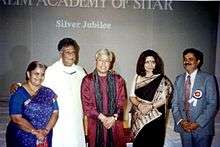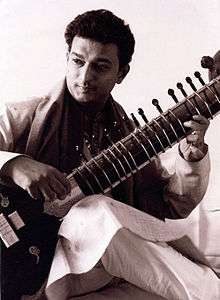Abdul Halim Jaffer Khan
| Abdul Halim Jaffer Khan | |
|---|---|
 | |
| Background information | |
| Born |
1929 Madhya Pradesh, India |
| Genres | Hindustani classical music |
| Occupation(s) | Sitarist, Composer, Innovator, Author |
| Instruments | sitar |
| Labels | Various |
| Associated acts | Ravi Shanker, Vilayat Khan, Julian Bream, Dave Brubeck, Zunain Khan |
| Website | www.jafferkhanibaaj.com |
Abdul Halim Jaffer Khan is an Indian sitar player. Khan received the national awards Padma Shri (1970) and Padma Bhushan (2006) and was awarded the Sangeet Natak Akademi Award for 1987.[1][2]
Life
Abdul Halim Jaffer Khan regarded as one of the 'Sitar Trinity' of India along with Ravi Shankar and Vilayat Khan and is the youngest of them. He was born in 1929, in Jawra, Madhya Pradesh, as the son of Jaffer Khan, a versatile vocalist, sitarist and beenkar. He hails from the Beenkar Gharana of Indore. He has been a distinguished All India Radio Artiste since the early 1940s.[3] A few years before the Beatles met Ravi Shankar, in 1958, Khan collaborated with jazz pianist and composer Dave Brubeck. Brubeck who was in Bombay through the state sponsored "jazz diplomacy" - the Jazz Ambassadors Program was impressed by the improvisation in Indian music and said that the experience accompanying Halim Jaffer Khan led him to play in a different way. He says of that meeting, "We understood each other." Khan also performed with the noted English classical guitarist Julian Bream in 1963.
Abdul Halim Jaffer Khan is perhaps best known for his innovation, Jafferkhani Baaj.[4] He describes it as, "a synthesis of precision in technique, systematic thought"[5] with a vigorous playing style. Cultural anthropologist and reader at the University of Mumbai, Dr. Kamala Ganesh states: "His music making is full of eclectic yet deeply informed choices. He is a thinking musician but puts across his complex views with a simplicity and feeling which demarcate the articulate performer from the articulate theoretician.... In him, one gets an unmistakable sense... a syncretic tradition".[6] The Indian santoor player Shivkumar Sharma remembers of Khan's performance of the raga Chaayanat: "It was probably in 1955-56, I was relaxing in my terrace in Jammu. In the stillness of the night I heard the notes of Raga Chaayanat on the sitar emanate from my neighbor's radio. I immediately noticed that the tone of the sitar was completely different and the style of playing radically unique. I rushed to switch on my radio.... I was totally engrossed and was very curious to know who this maestro was."[7]
Of ragas such as Kirwani, Abdul Halim Jaffer Khan has been credited with bringing Carnatic ragas into the sitar repertoire: Kanakangi, Latangi, Kirwani, Karaharapriya, Manavati, Ganamurti, etc. but rendering them through a Hindustani sensibility and in the Jafferkhani style. He was the first Hindustani musician to collaborate with Carnatic music in a performance with renowned Veena player Emani Sankara Sastry. His early experimentation with polytonality in Indian classical instrumentation (which is largely solo performance) was achieved in his sitar quintet.
Khan has had a valuable involvement with Indian cinema. Music Director Khwaja Khurshid Anwar introduced him in films in 1946 when he played Sitar in the songs of film Parwana (1947 film). He has composed and played for epic films like Mughal-e-Azam,[8][9] Jhanak Jhanak Payal Baaje (1971), Goonj Uthi Shehnai (1959), Kohinoor (1960) and has collaborated with noted music directors such as Vasant Desai, C. Ramachandra, Madan Mohan and Naushad who has said, "he not only enriched film music, but his participation lent prestige to my songs."[10]
In 1976, Abdul Halim Jaffer Khan created the Halim Academy of Sitar in Mumbai, India.

His legacy is being carried on by his son Zunain Khan, an accomplished sitarist himself.

Select awards
- Tagore Ratna (Sangeet Natak Akademi) in 2012
- Padma Bhushan (Govt. of India) in 2006
- Lifetime Achievement Award (Legends Of India) in 2005
- Hafiz Ali Khan Award (Haafiz Ali Khan Memorial Trust) in 1992
- Shikhar Samman (Govt. of Madhya Pradesh) in 1991
- Gaurav Puraskar (Govt. of Maharashatra) in 1990
- Sangeet Natak Akademi Award 1987
- Padmashree (Govt. of India) in 1970
Video
Narrated by violinist Yehudi Menuhin, Deben Bhattacharya's film Raga features a young virtuosic Halim Jaffer Khan playing raga Sindh Bhairavi.
Select discography
- 75th Celebration Swar Sadhna (Raag Zila Kafi)
- 70th Birthday Release (Raag Tilak Kamod, Raag Jaijaiwanti, Raag Sindhi Bhairavi)
- Columbia (EP) (Raag Mand, Raag Ahir Bhairav)
- Enchanting Sitar (Raag Aarabi, Raag Multani)
- Guzra Zamana (Live in Concert- 1968) (Raag Abhogi)
- His Master's Voice (EP) (Chakra dhun, Thumri in Deepchandi taal)
- Immortal Series: Vol 1 (Raag Pahadi, Raag Kedar); Vol 2 (Raag Kirwani, Raag Jaunpuri)
- Instrumental Classical: Sitar (Raag Jaijaiwanti, Raag Sindhi Bhairavi)
- Lifting Strings (Raag Bhairavi, Raag Gaud Sarang, Raag Kamod, Raag Rageshri, Raag Shyam Kalyan, Raag Yaman Kalyan)
- Live in Jaipur 1968
- A Night at the Valley (Raag Kirwani, Raag Marwa, Raag Pahadi, Chakradhun, Thumri)
- Sangeet Suman (Raag Patdeep, Raag Shyam Kedar)
- Sitar Quintet (Raag Chandani Kedar, Raag Mazamiri, Raag Khusravani, Raag Sharavati, Raag Kalpana, Raag Miya ki Malhaar)
- Sitar Through the ages [Soofiyana rang, Raag Bhimpalasi, Raag Zila Kafi, Raag Farghana]
- Sitar Ecstasy [Raag Hemavati, Raag Jaitshri, Sufiana Sama (dhun)]
- Theme on Strings (Raag Saraswat Ranjani, Sitar Anjuman, Hulban)
- Ustad Abdul Halim Jaffer Khan (Raag Champakali, Raag Chhaya Nat, Raag Mishra Pilu)
- Ustad Abdul Halim Jaffer Khan (Raag Jaunpuri, Raag Rajeshwari, Raag Anand Bhairav, Thumri)
- Ustad Abdul Halim Jaffer Khan (Raag Araj, Raag Madhyami)
- Ustad Abdul Halim Jaffer Khan (Raag Marwa, Raag Pahadi)
References
- ↑ "Padma Awards". Ministry of Communications and Information Technology. Retrieved 17 September 2010.
- ↑ "SNA: List of Akademi Awardees – Instrumental – Sitar". Sangeet Natak Akademi. Retrieved 17 September 2010.
- ↑ , The Hindu, 19 July 1953.
- ↑ Mark Slobin; Frank Kouwenhoven Co-editor, CHIME; Ruth Hellier; Carole Pegg; Gerry Farrell Ethnomusicology Forum, 1741-1920, Volume 10, Issue 2, 2001, Pages 123–132
- ↑ Jafferkhani Baaj: Innovation in Sitar Music. Khan, Abdul Halim Jaffer. Jafferkhani Baaj: Innovation in Sitar Music. Kohinoor Printers, 2000.
- ↑ Jafferkhani Baaj: Innovation in Sitar Music. Khan, Abdul Halim Jaffer. Jafferkhani Baaj: Innovation in Sitar Music. Kohinoor Printers, 2000
- ↑ Jafferkhani Baaj: Innovation in Sitar Music. Khan, Abdul Halim Jaffer. Jafferkhani Baaj: Innovation in Sitar Music. Kohinoor Printers, 2000.
- ↑ Kabir, N.M. & Akhtar, S. (2007). The Immortal Dialogue of K. Asif's Mughal-e-Azam. New Delhi: Oxford University Press.
- ↑ http://www.imdb.com/title/tt0054098/awards
- ↑ Dhaneshwar, Amarendra. Strings Attached Archived 2 July 2010 at the Wayback Machine., "The Times of India", 19 February 2010.
- Jafferkhani Baaj: Innovation in Sitar Music. Khan, Abdul Halim Jaffer. Jafferkhani Baaj: Innovation in Sitar Music. Kohinoor Printers, 2000.
External links
- Abdul Halim Jaffer Khan at AllMusic
- The Beenkar Gharana, ITC Sangeet Research Academy, Kolkata, 2001.
- JafferKhaniBaaj - Official Website
- The Sitarist's Sitarist